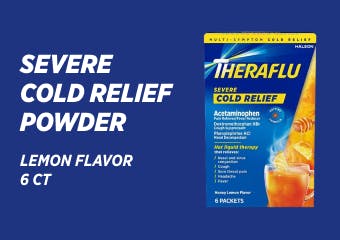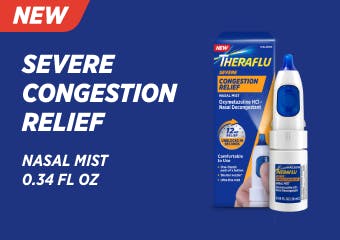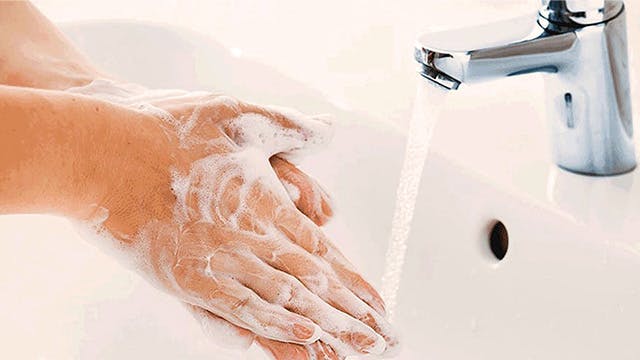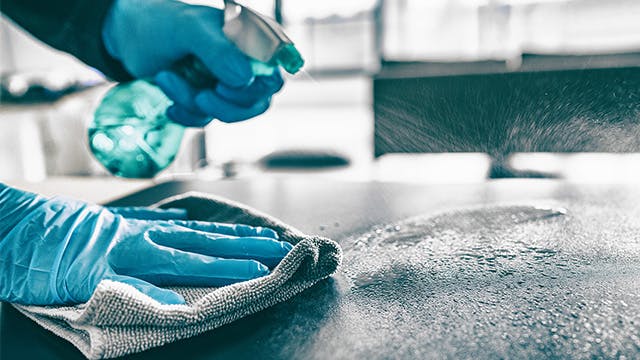Wash your hands frequently.
You’ve probably told your children to wash their hands before meals, after playing outside, when they get home from school, and when they go to the bathroom — and to do so even more when it’s cold and flu season. Well, now you have to really practice what you preach. Handwashing with soap keeps you and your family healthy by removing germs from hands and keep them from spreading all around the house. You may be touching your eyes, nose, and mouth without realizing it, making yourself vulnerable to sickness. Remember to wash your hands for at least 20 seconds to ensure that they’re thoroughly disinfected. Wash your hands every time you’re in contact with your sick child — just don’t go overboard. “You’re washing your hands too much if the skin starts cracking from dryness,” Honaker said.
Stock up on germ-killing cleansers.
We’re not saying you have to go disinfect every last thing in your home all day every day when your child is sick. But you should stay on top of surfaces in common areas like the kitchen, bathroom, and living room. Cleaning removes germs while disinfecting kills them, and both together decreases the spread of infection. Honaker recommends keeping all counter surfaces and tabletops free from sneezes, coughs, and saliva by immediately cleaning any visible soils. You should also be regularly wiping down and disinfecting other germy hotspots like light switches and different door handles to prevent germs from spreading, especially while your child is sick. Shared household objects that are touched often like tablets and remotes should also be disinfected after use. To cut down on additional germ spreading, teach (and practice) good coughing and sneezing etiquette. Show your little ones how to cover their mouths and noses properly using their hands or upper shirt sleeves.
Amp up your immune system.
In order to give your little ones the attention they need to recover, you’re going to have to keep up your own immunity, strength, and energy levels. “Sleep and exercise are important but not preventive,” Honaker said. “However, sleep deprivation can reduce immunity.” Get plenty of rest, and try to move your body a little, whether it’s a walk around the block or an exercise class at a gym. Another great way to amp up your immune system is to make sure that you’re getting enough vitamin C in your diet. Vitamin C plays an important role in immune function and can aid your immune system when fighting off a cold.1 Although there is no strong evidence that vitamin C can prevent you from getting a cold, an adequate intake of vitamin C can shorten the duration of the common cold and can make your symptoms less severe.1 Make sure you’re eating foods with vitamin C or taking vitamin C supplements if you feel a cold coming along so you can help your immune system fight it faster and feel better in no time.
Stay hydrated.
Even with all the preparation in the world, sometimes you just can't avoid catching a cold that's going around your house. It’s important to stay hydrated once you’re feeling sick to avoid getting dehydrated. Illness can lead to dehydration, especially if you are sweating or vomiting.2 Drinking plenty of fluids when you’re sick can help to replenish lost fluids and flush out waste. Remember to always drink plenty of fluids when you’re sick, even if you don’t feel thirsty. Adults should drink around 8 cups of water per day, but the amount of fluid one needs can vary based on many factors including illnesses.2 As far as diet goes, “just eat plenty of fruits and vegetables and stay well hydrated,” Honaker said. “Fluids will help keep mucus thin, and this makes the mucus less favorable for the germs.” It is estimated that foods provide 20% of our water intake, so including plenty of water-rich fruits and vegetables to your diet can also be a good source of fluids.2
Hit your cold with a one-two punch of hydration and medicine by brewing up a cup of Theraflu Multi-Symptom Severe Cold Hot Liquid Powder at the first sign of symptoms. Theraflu Multi-Symptom Severe Cold Hot Liquid Powder delivers powerful relief from your symptoms in the form of a warm, soothing liquid.
Listen to your body.
Know the signs of contagiousness, and if you or your child exhibits them, stay home and let yourself heal. “The only reason to take off work or school is if you have a fever, muscle aches, and moderate to severe fatigue — these indicate contagiousness,” Honaker said. “Rest helps, but the main thing is ‘tincture of time.’”
It's hard to avoid getting sick while helping your kiddos recover from their colds or flus, but taking the necessary steps to protect yourself can minimize the chances of getting sick altogether. For more tips on prevention and staying healthy, visit the Theraflu Prevention page.





